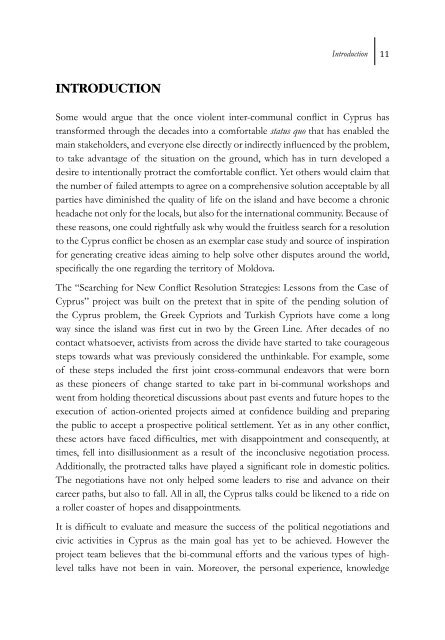Managing Intractable Conflicts: Lessons from Moldova and Cyprus
Managing Intractable Conflicts: Lessons from Moldova and Cyprus
Managing Intractable Conflicts: Lessons from Moldova and Cyprus
You also want an ePaper? Increase the reach of your titles
YUMPU automatically turns print PDFs into web optimized ePapers that Google loves.
Introduction<br />
11<br />
INTRODUCTION<br />
Some would argue that the once violent inter-communal conflict in <strong>Cyprus</strong> has<br />
transformed through the decades into a comfortable status quo that has enabled the<br />
main stakeholders, <strong>and</strong> everyone else directly or indirectly influenced by the problem,<br />
to take advantage of the situation on the ground, which has in turn developed a<br />
desire to intentionally protract the comfortable conflict. Yet others would claim that<br />
the number of failed attempts to agree on a comprehensive solution acceptable by all<br />
parties have diminished the quality of life on the isl<strong>and</strong> <strong>and</strong> have become a chronic<br />
headache not only for the locals, but also for the international community. Because of<br />
these reasons, one could rightfully ask why would the fruitless search for a resolution<br />
to the <strong>Cyprus</strong> conflict be chosen as an exemplar case study <strong>and</strong> source of inspiration<br />
for generating creative ideas aiming to help solve other disputes around the world,<br />
specifically the one regarding the territory of <strong>Moldova</strong>.<br />
The “Searching for New Conflict Resolution Strategies: <strong>Lessons</strong> <strong>from</strong> the Case of<br />
<strong>Cyprus</strong>” project was built on the pretext that in spite of the pending solution of<br />
the <strong>Cyprus</strong> problem, the Greek Cypriots <strong>and</strong> Turkish Cypriots have come a long<br />
way since the isl<strong>and</strong> was first cut in two by the Green Line. After decades of no<br />
contact whatsoever, activists <strong>from</strong> across the divide have started to take courageous<br />
steps towards what was previously considered the unthinkable. For example, some<br />
of these steps included the first joint cross-communal endeavors that were born<br />
as these pioneers of change started to take part in bi-communal workshops <strong>and</strong><br />
went <strong>from</strong> holding theoretical discussions about past events <strong>and</strong> future hopes to the<br />
execution of action-oriented projects aimed at confidence building <strong>and</strong> preparing<br />
the public to accept a prospective political settlement. Yet as in any other conflict,<br />
these actors have faced difficulties, met with disappointment <strong>and</strong> consequently, at<br />
times, fell into disillusionment as a result of the inconclusive negotiation process.<br />
Additionally, the protracted talks have played a significant role in domestic politics.<br />
The negotiations have not only helped some leaders to rise <strong>and</strong> advance on their<br />
career paths, but also to fall. All in all, the <strong>Cyprus</strong> talks could be likened to a ride on<br />
a roller coaster of hopes <strong>and</strong> disappointments.<br />
It is difficult to evaluate <strong>and</strong> measure the success of the political negotiations <strong>and</strong><br />
civic activities in <strong>Cyprus</strong> as the main goal has yet to be achieved. However the<br />
project team believes that the bi-communal efforts <strong>and</strong> the various types of highlevel<br />
talks have not been in vain. Moreover, the personal experience, knowledge

















